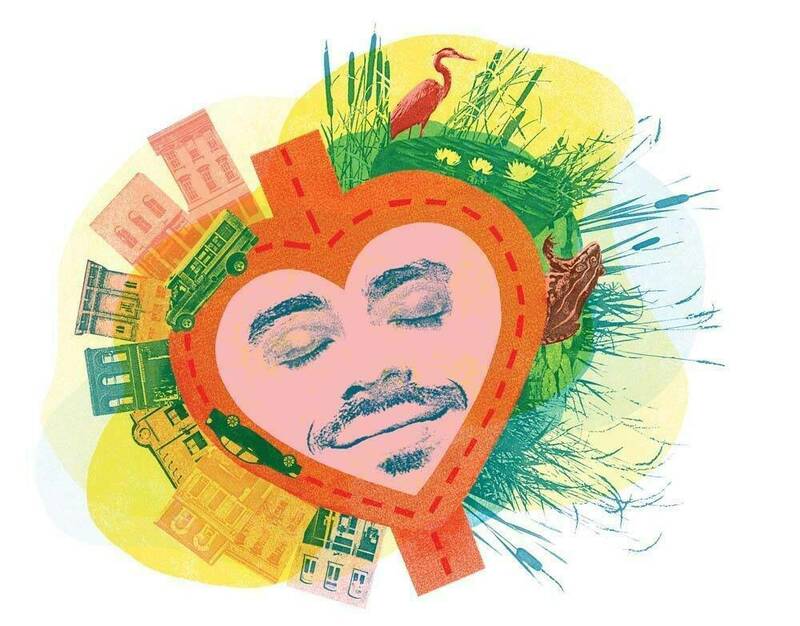 Illustration by Marianne Chevalier
Illustration by Marianne Chevalier
Every morning, I’m faced with a choice. Choices imply options, and options are generally a good thing to have. But too early in the day, even a trifling decision can be troublesome, and I shy away from it as much as the next fellow.
In the eternal business of men and angels, this particular choice is not earthshaking. My job challenges me to be up and away before the dew is off the grass. Work is good, both to have it and to do it. Mine takes me to the far side of town, requiring a short brisk walk. This is where my daily choice comes in.
Just up the road, past the Red Onion Inn with its honeysuckle hedge and handcarved sign, the road splits. A quarter of a mile further on, the two roads meet again, in a friendly sort of way, as if they rather missed each other and feel better now about moving forward together. To the left or to the right, the walking time is identical. Just for the fun of it, some days I turn left, and some I turn right.
Where the roads merge, a quaint stone house nestles within a tidy flower garden that has a low wooden fence and a burly brown gate. This is the home of Carl Evans. Through the window most mornings, as I pass by on one side of his house or the other, I see Carl seated in his rocking chair, clad only in shorts and a white tank top, huddling over his tankard. I had no proof that what’s inside it is coffee, but what else would a man cling to with such devotion so early in the morning? In modest celebration of our daily communion, I wave or nod to him, and he to me.
Then one morning, he is out on the sidewalk, cup in hand, still in his shorts and tank top, still shivering slightly. Judging by the aroma, his brew is Strong and Able, ready to storm the ramparts, and hot as blazes, for I can see tiny heat waves billowing around the top of the mug, and he carries it gingerly.
Carl Evans is a codger, graying around the eyebrows and wonderfully wrinkled on all surfaces. He has a generous warm smile.
“I see you come by every morning,” he says without introduction. “Sometimes you come from the left, and sometimes from the right. It’s driving me bananas to know why you choose one road over the other.”
“I don’t know,” I tell him. “I’ve been puzzling over it myself. Let me chew on it a bit, and we’ll touch base tomorrow, shall we?”
He nods affably and wanders up his garden path, following, it seems, wherever his coffee leads him.
Why do I choose one route over the other? I use both with about equal frequency. The natural thing, I suppose, would be to measure it out, choose a direction based on sound reasoning and solid science, and stick with it. But for some reason, I can’t seem to decide once and for all. Why?
When I come to the fork, I do not make a conscious decision. I simply follow my instincts. Yogi Berra said it perfectly: “If you come to a fork in the road, take it.” All roads are good, no bad choices here, Berra seems to be saying. Maybe Robert Frost had similar thoughts when he spoke so eloquently of taking the road less travelled by.
Turning it over in my mind, I see one distinct difference between my two routes. The road to the left passes through the town. If I take it, I see happy children heading off to school with their laden bookbags and colorful lunch pails. I see anxious mothers craning their necks at windows to make sure their little ones have made it safely aboard the No. 2 short bus. I wave to Mr. Isaacs, who is sweeping out the entry of his tiny bookstore, and I see Papa Nono heading for the Citgo where he volunteers every day. It’s a beautiful thing to watch the soothing bustle of the town coming alive.
The lane to the right goes around the town. There I see the tall grass of the open fields rippling in the breeze and hear the chirrup of the red-winged blackbirds in the reeds. In the swamp, the bullfrogs croak, their vocal sacs bubbling dangerously, their great eyes bugging out as they twang and plunk their crazy rhythms with monotonous enthusiasm. Sometimes they play Latin jazz with a flare of Thelonious Monk, and I am unable to repress a laugh. Occasionally they crank out a rhythm that makes my heart sing, but mostly it’s a mad melee of free expression.
The bullfrogs are irrepressible, cheerful and exuberant. Surrounded by lily pads, white blossoms, frisking minnows and sunbathing painted turtles, they never cease, save when the wily great blue heron glides in to threaten their very existence.
Distilled to its essence, then, my choice of which way to turn at the fork comes down to town or country, people or nature. Both, I believe, are vital human needs. A day devoid of human contact would surely be lonely and sad. And a world without the healing power of nature would be dry and dusty at best.
Tomorrow, strolling once more to work, I will come to that same fork. I will have yet another decision to make, but it will not be difficult. Left or right, town or country, it’s a good choice. Either way, I will wave at old Carl huddled over his coffee, and he’ll wave back at me. And I’ll walk on, assured that I made the right choice.
Kirk Wareham is a father of six and grandfather of six who lives and writes in Esopus, New York.